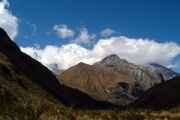The UNESCO-listed Huascaran National Park harbouring Peru’s highest mountain and world’s second most difficult mountain to climb is simply magnificent and exceptionally picturesque. The landscape is stunning and unforgettable.
|
It is actually quite difficult to choose what to see and do in the Cordillera Blanca. The mountain range is vast and the scenery is so striking and breathtaking that it is seriously hard to describe. One could spend weeks and weeks trekking in the Andes without end, which is dangerously addictive. It is so easy to forget about the world.
One of the better places to start exploring the Cordillera Blanca was Huaraz. It was pretty well connected with both Lima and Trujillo. And it was really well organised, with many tour, mountaineering, hiking and serious climbing agencies. I knew I wanted to see the mountains, preferably the highest mountain, but I needed help to get things organised. I didn’t even know what trails I could do.
I arrived at 5 a.m. when it was still dark and quickly checked in to Hostal Montañero, and went to bed for four hours. I took it easy that morning. Not only had I travelled a thousand miles for the last two days and two nights on buses, but also descended and ascended almost 5,000 metres within 48 hours. Patapampa , where I came from, was at the elevation of 4,920m, Lima at sea-level and Huaraz again at 3,091m. I was impressed with my body that it took it very well, without even a slightest headache.
I looked up a few trekking agencies in town and went enquiring what would be the best for me to pick from the long list of treks to accommodate my very clear requirements. This could have not been easier. If you have cash, then you can do anything there in the Andes. Some agencies were more technical that others (real, sophisticated maps, professional advice for serious climbing) and some were more orientated towards trekking (clear pricing lists, photographs). I chose to do a couple of one-day treks in the mountains. The first one was the highest peak of Peru – the Huascaran. The second – a panoramic view of the mountain range, and potentially a lake and a glacier high in the mountains.
|
|
| Favourite spots: |
 |
 |
 |
 |
 |
 |
 |
 |
Huascaran (right) and Huandoy (left) behind the clouds
 |
 |
If weather is good, a nice panoramic view can actually be appreciated from a hill outside the town or even right from the Plaza de Armas in Huaraz. I sat down at the top of dead fountain in the very centre of it, which was poorly restored after the 1970 earthquake, but it was too cloudy. No clear views! Instead, I spoke to local kids and some other local and less local Peruvians. One of them, a dentist migrated from Lima, told me the legend of Huascaran. Here it is:
Prince Huascaran was truly and deeply in love with Princess Huandoy from neighbouring kingdom. Unfortunately, the kingdoms were at war. Their love was like a forbidden fruit. It was totally off limits. One day the Prince was spotted by his father’s guards, the lovers were brought to their parents who tied the lovers' hands behind their backs. Standing at the front of each other they cried their eyes out, which in centuries, turned into ice - two peaks - Huascaran and Huandoy. To this day they stand opposite one another.
|
|
| What's really great: |
Next day, I went to see Lago 69, a pretty lake at the feet of mountains Pisco (5,752m) and the second most difficult mountain in the world – Chacraraju (6,112m). It was an early start for a day trek, and I was already pissed off that weather betrayed me again. It was grey and very cloudy. It looked like there were no mountains around at all!
Fortunately, the sky cleared a bit later that morning and I could barely see the legendary Huascaran (6,768m) and Huandoy (6,395). It wasn’t too great. The clouds were quickly covering the peaks.
The trail to Lago 69 could also be called the ‘poopy’ trail. Not because it was not nice, but because there was so much excrement on the trail. The droppings were left by cows and donkeys. There was so much dung everywhere like there were at least ten thousand cows and donkeys there. How shocked was I to find out later that there were only twelve cows and eight donkeys! I was impressed with their appetite! The real name of the trek was Llanganuco.
|
|
| Sights: |
The trek itself wasn’t too hard but the altitude of 4,600 meters left me out of breath occasionally, triggered by additional difficulty to navigate between the turd. The lake was small and pretty, but the views to Pisco and Chacraraju, and their glaciers took even more breath away.
I was sad that en route, the peaks of Huandoy and Huascaran could not be clearly seen, but the Yanapaqcha (5,460m) was eventually uncovered with nice glaciers as well. It wasn’t the grand panorama of the Cordillera Blanca I was hoping for, but I was very happy with what I fortunate to see. I didn’t meet many people on the trail so the scenery, although in mediocre weather, was for my eyes only at that moment.
The next day, weather further declined and prevented me from climbing to Lago Churup. I did set out, though but at 4,000m it started raining and snowing slightly, and I decided to visit a few small villages at the feet of Churup, instead. One of them was very, very basic Pitec.
|
|
| Accommodations: |
|
I stayed at the very central Hostal Montañero ($35), which was great. It was modern and clean. The most important for me was the bathroom with hot water (it was cold and wet in the mountains). One of the balconies offered partial views towards the mountain range. The staff were very helpful and some of them actually worked also with the licensed guides agency. It wasn’t the cheapest, or the most expensive, option in town. There were a few cheaper youth hostels available, but I wanted to splurge a little after having saved on two nights accommodation by travelling on the overnight buses.
|
|
| Nightlife: |
|
Huaraz attracted many young people and backpackers ,and there were many places to go out. Some of the places were frequented by the travellers only, some almost exclusively by local teens, and some a mixed crowd. One of my favourites was Aquelarre. It was a low profile with pleasant music. Las Kenas managed to mix decent pisco sour (two hours of happy hour) and played local folk music. The discos and nightclubs remained open until wee hours in the morning, usually 4 o’clock. The popularity varies, so it’s best to ask the travellers, where it’s safe. Also, certain places do not open at low season at all (December to March).
|
|
| Hangouts: |
The town was not particularly nice. It was completely destroyed by a series of earthquakes (most recently in 1970) and the authorities did not care to reconstruct it. Well, I will not beat about the bush - the town was ugly. The only attractive spot to linger was a small square Plaza Gineba (my hotel stood there).
Anyway, a few cafes around the town were atmospheric enough to call them hangouts. The one I liked was run by the Americans - Cafe Andino. It was a good place to take it easy and meet other travellers. For cakes and coffee, Cafe de Paris (run by the French!) was much better though and was also popular with the trekkers.
Yet, the best spot to relax and hang out would be Laguna Llanganuco, the easiest to reach of the glacier lakes. It offered superb views and there was a little cabin and park there with simple facilities. The colour of the water was changing as the clouds covered less or more of the sky.
|
|
| Restaurants: |
I was so pleased with myself that I found a Thai restaurant that I felt I should have got a medal for it. The name of the restaurant was Siam de Andes and it served absolutely fabulously yummy Thai buffet. Two starters and one main course cost 28 PEN or 8 USD. That could not be any better! The Pad Thai was arguably the best Pad Thai dish in the entire Western Hemisphere. And being addicted to Thai food, I had eaten many Pad Thai and curry dishes in my life! This wonderful restaurant saved me from eating another guinea pig or fried and questionably fresh trout. Plus they were playing the fantastic Annie Lennox’s album – Bare, which complemented the entire experience. I had heaven in my mouth (green curry) and heaven in my ears, what else could I to ask for?
This travel report is a supplement to the Peru Trilogy:
1. Puno & Lake Titicaca
2. Arequipa, Colca Canyon & Condors
3. Trujillo, Huanchaco & Chan Chan
|
|
| Other recommendations: |
|
I was lucky with the altitude sickness. I didn’t treat my body too well on this trip and surprisingly I didn't get sick. I flew from Lima to Cusco and started trekking to 4,000m the same day without getting used to the altitude. Then, within a day, I descended from 4,920m to the sea level completely and then, again overnight up to 3,100m in Huaraz. Whilst I was trekking in the Cordillera Blanca, I did get breathless, but I would like to believe it was due to an unexpected navigational (dung!) difficulty. Normally, it is recommended to stay in the area for a few days to acclimatise before doing any trekking or climbing, but I did not have enough days in my itinerary. However, I was drinking plenty of water on the slopes and few coca teas in the evening. And only when I descended from Lago 69, I noticed a slight headache. I later learnt that it was triggered by not drinking water on the way down. Apparently, it was important to drink water while ascending AND descending.
|
|
Published on Sunday March 23th, 2008
|
|
 Publish on Facebook
Publish on Facebook
|
Tue, Jun 03 2008 - 10:27 AM
 by magsalex
Mon, Mar 31 2008 - 11:30 AM
 by eirekay by eirekay
| Krys, this is a wonderful report with great hiking info! You have a terrific style - very enjoyable to read! |
Fri, Mar 28 2008 - 05:09 AM
 by jorgesanchez by jorgesanchez
Tue, Mar 25 2008 - 06:39 AM
 by rangutan by rangutan
| An excellent hiking reoport, I wish we had more of these at GLOBO [4.6] |
Mon, Mar 24 2008 - 12:42 PM
 by davidx by davidx
| It's most impressive that you can maintain your standard over so many reports. |
Mon, Mar 24 2008 - 12:16 AM
 by ravinderkumarsi by ravinderkumarsi
| HII KIYA,nice to read again such a excellent report from you ,great effort |
| Information: |
| Login if you are a member, or sign up for a free membership to rate this report and to earn globo points! |
|
| Mauritius |
|
|
 |
| Moldova |
|
|
 |
| Monaco |
|
|
 |
| Montenegro |
|
|
|
|
|
|
|
|
 |
| Morocco |
|
|
 |
| Mozambique |
|
|
|
|
|
|
 |
| Namibia |
|
|
|
|
|
|
 |
| Netherlands |
|
|
|

|
